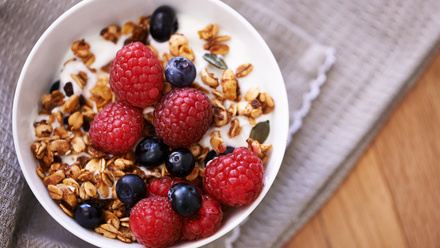We all have good days and bad days and we all have foods we prefer, or like less. But is there a connection between feeling fine and the foods we have eaten? Do some foods make us feel grumpy? Is it possible to plan a diet for a good mood?
Do vitamins and minerals influence mood?
When we don’t eat enough nutrient-rich foods, our bodies may lack vital vitamins and minerals, which may affect our feelings, our sense of energy and our mood.
We should aim to get our vitamins and minerals from eating a healthy, balanced diet with plenty of fruit and vegetables.
In certain circumstances or for certain people, supplements may be beneficial e.g. folic acid for all women planning pregnancy, iron supplements for people diagnosed with anaemia, vitamin B12 for vegans and older adults, and vitamin D for everyone in winter months, and all pregnant and breastfeeding women, older adults, and people with a darker skin tone.
Carbohydrate = glucose = brain power
The brain needs enough energy to be able to concentrate and focus, this energy comes from blood glucose. The brain uses 20% of all the energy the body needs.
Glucose is also vital to fuel muscles and maintain body temperature. The glucose in our blood comes from the carbohydrates we eat – including fruit, vegetables, cereals, bread, rice, potatoes, sugars and lactose in milk.
Eating breakfast and regular meals containing some carbohydrate helps us have enough glucose in our blood.
Healthier sources of carbohydrates include wholegrain breads and cereals, vegetables, fruits and legumes. These are important sources of other nutrients as well, such as fibre and vitamins and minerals.
Not having enough glucose in our blood (hypoglycaemia) can make us feel weak, tired and ‘fuzzy minded’. This may happen when we don’t eat enough carbohydrate-containing food, and is a particular risk if we have diabetes or do extreme exercise or manual labour. It can also happen if we follow a very restrictive diet or have irregular eating patterns.
Although glucose ensures good concentration and focus, once our blood glucose is within the normal range, we cannot further boost our brain power or concentration by increasing our glucose levels. That’s why, if we are eating some carbohydrate foods, additional sugary ‘energy’ drinks are not needed and not helpful.
Why do we comfort eat?
There is a messenger chemical in the brain called serotonin, which improves mood and how we feel. Serotonin is made with a part of protein from the diet (tryptophan) and eating carbohydrate-rich foods may help more of this get into the brain.
This has been used to explain ‘carbohydrate craving’ – eating sweet, comfort foods to boost mood. However, there is not enough research to show that eating lots of protein foods containing tryptophan or eating a lot of carbohydrates can really support mood improvement in humans. But it may be that not eating enough carbohydrate (for example through a high protein/high fat diet) leads to low moods.
We’ve all heard that eating chocolate can make us feel happier, and there are observations that people with a low mood get pleasure from eating ‘treat’ foods such chocolate. But, this is probably because chocolate is a well-known reward and comfort food, rather than due to any potent physiological effects particular to cocoa.
Caffeine and the ‘drug-effect’
Caffeine, found in coffee, cola and energy drinks, is often called a drug. It acts as a stimulant and can increase feelings of alertness, and counter the effects of fatigue. However, it may be that some effects of caffeine actually ‘normalise’ the lower levels of alertness felt by regular users who have not consumed enough caffeine that day.
Too much caffeine, particularly in people who are not used it, may cause irritability and headaches. Such symptoms also occur with caffeine withdrawal in people used to lots of caffeine on a regular basis.
Vitamins and minerals - effect on mood and what foods can help
|
Vitamin/mineral |
Effect on mood from not enough of this nutrient |
Foods which can help
|
|
Iron
|
Feeling weak, tired and lethargic all the time. Not getting enough iron results in low levels of oxygen carrying haemoglobin in the blood, resulting in the condition anaemia. |
The risk of anaemia is reduced by eating enough iron, particularly from red meat, poultry and fish, beans, pulses and fortified cereals. Avoid drinking tea with meals. |
|
Thiamin B1, Niacin B3 or Cobalamin B12 (all B vitamins) |
Tiredness and feeling depressed or irritable. |
Fortified foods including wholegrain cereals, animal protein foods such as meat, fish, eggs and dairy. |
|
Folate / folic acid |
Increased chance of feeling depressed, particularly important in older people. |
Folate is found in liver, green vegetables, oranges and other citrus fruits and beans. Folic acid is added to fortified foods including yeast extract (marmite) and some breakfast cereals. |
|
Selenium |
May increase the incidence of feeling depressed and other negative mood states. |
Brazil nuts, meat, fish, seeds and wholemeal bread. |
The gut-brain axis
There is a growing interest in the link between mood and the gut microbiome (the trillions of bacteria resident in the human colon). Consistent research outcomes are needed before any valid claims can be made about this.
Omega-3 fats
Long-chain omega-3 fats (found in fatty fish) support. Some research suggests that diets containing omega-3 fats may help to reduce low mood states (feeling depressed) in adults. They are also incredibly important for the development of the foetus during pregnancy.
So, does food affect mood?
There are many ways that foods can affect how we feel, just as how we feel has an influence on the foods we choose. Some of the mood/food effects are due to nutrient content, but a lot of effects are due to our cultural associations of foods with pleasure and reward (e.g. chocolate) or diet and deprivation (plain foods).
Some foods also have religious, economic and cultural significance, which will influence how we feel when eating them.
Top tips
- Feeling good comes from a diet providing enough healthy choice carbohydrates at regular times to keep blood glucose levels stable, and eating breakfast is a sensible habit
- Diets should contain a wide variety of protein and vitamins and minerals containing foods to support the body’s functions
- As a rule, plenty of fruits, vegetables and wholegrain cereal foods, with some protein foods, including oily fish, will support a good supply of nutrients for both good health and good mood
Source(s)
Arens U (2018) Authorised EU health claims for carbohydrates and maintenance of normal brain function. In: Foods, Nutrients and food Ingredients with Authorised EU Health Claims – volume 3. Woodhead Publishing
Benton, D. and Cook, R. (1991) Selenium supplementation improves mood in a double-blind crossover trial. Biological Psychiatry 29, pp.1092-98
Benton, D. and Donohoe RT. (1999) The effects of nutrients on mood. Public Health Nutrition, 2(3a) 403-409
Firth, J., Gangwisch JJ, Borsini A, Wootton RD, Mayer EA (2020) Food and mood: how do diet and nutrition affect mental wellbeing? BMJ 369.m2382
Gilbody, S., Lightfoot, T. and Sheldon, T. (2007) Is low folate a risk factor for depression? A meta-analysis and exploration of heterogeneity. Journal of Epidemiol Community Health 61, pp.631-637
Gomez-Pinilla, F (2008) Brain foods: the effects of nutrients on brain function. Nat Rev Neurosci 9 (7) 568-578
Hulsken S, Martin A, Mohajeri MH, Homberg JR (2013) Food-derived serotonergic modulators: effects on mood and cognition. Nutrition Research Reviews, 26, 223-234
Nabb, S. and Benton, D. (2006) The influence on cognition and mood of the interaction between the macro-nutrient content of breakfast and glucose tolerance. Physiology and Behavior 87, pp.16-23
Parletta N, Zarnowiecki D, Cho J, Wilson A, Bogomolova S, Villani A, Itsiopoulos C, Niyonsenga T, Blunden S, Meyer B, Segal L, Baune B, O’Dea K (2019) A Mediterranean-style dietary intervention supplemented with fish oil improves diet quality and mental health in people with depression: A randomized controlled trial (HELFIMED) Nutr Neursci. Jul; 22(7):474-487
Rayman, MP. (2000) The importance of selenium to human health. Lancet 356, pp.233-41
Rogers, PJ. (2007) Review: Caffeine, mood and mental performance in everyday life. Nutrition Bulletin 32, pp.84-89
Rose, N., Koperski, S. and Golomb, B. (2010), Chocolate and depressive symptoms in a cross-sectional analysis. Arch Intern Med 170 (8), pp.699-703
Wurtman, RJ., Wurtman, JJ., Regan, MM., McDermott, JM., Tsay, RH. and Breu, JJ. (2003). Effects of normal meals rich in carbohydrate or protein on plasma tryptophan and tyrosine ratios. American Journal of Clinical Nutrition 77 (1) pp.128-32
Yin W, Lof M, Chen R, Hultman C, Fang F, Sandin S (2021) Mediterranean diet and depression: a population-based cohort study. Int J Behav Phys Act 18,153







